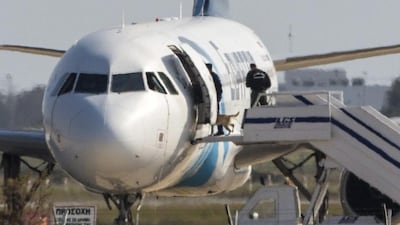It is perhaps out of a sense of relief that many have taken to joking about the hijacking of the Egypt Air flight out of Alexandria. At a time of extraordinary threats to aviation, the hijack could easily have gone a different way. The fact that it didn’t is to be welcomed – but that doesn’t change the serious concerns that the incident raises.
The man at the centre of the drama, named as Seif Eldin Mustafa, was apparently seeking a reconciliation with his estranged wife – prompting Cypriot’s president Nicos Anastasiades to say, perhaps rather too flippantly, “there is always a woman”.
Social media users also made jokes about the incident, ranging from noting that many ex-husbands would have hijacked a plane to get away, to wondering if the man simply pined for Cyprus’s tourist beaches.
Yet there is little light-hearted about the hijack. The fact that the hijacker was able to reroute a plane simply by a threat is testament to the unsettling world in which we now live.
Even if his threat did not seem credible, nor his “bomb belt” particularly sophisticated, there is no pilot flying today who would not have taken him at his word.
After all, it was not that long ago that so-called “shoe bomber” Richard Reid – himself hardly the most sophisticated attacker – almost succeeded in bringing down an aircraft. These are dangerous times.
The most immediate reaction will be people calling for air marshals on more aircraft. In this case, most probably, an armed air marshals would have had a limited effect – it is unlikely anyone would take the risk of shooting a man who appears to be strapped with explosives.
But just knowing that there is a chance that an air marshal is on board would be enough to deter most copycat hijackers, and give them pause for thought.
There also needs to be a recognition that there is a limited amount that can be done. In the past few years, aircraft have been brought down by bombs, shot down with missiles or deliberately crashed by suicidal pilots – but these are rare events. Flying remain a safe way to travel– regardless of the actions of one unstable hijacker.

